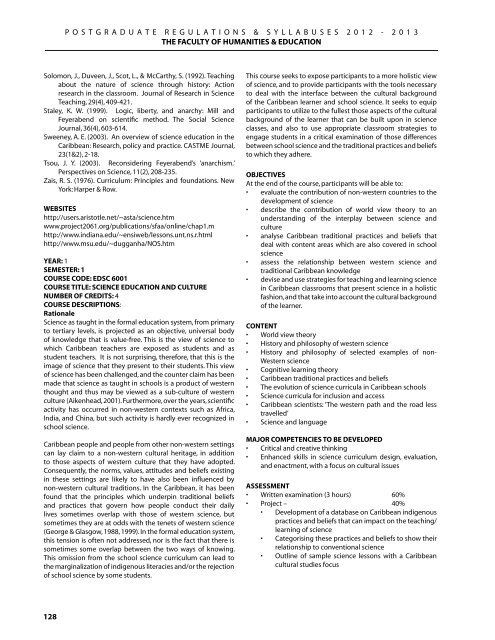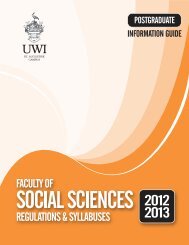Faculty of Humanities and Education (Postgraduate) - The University ...
Faculty of Humanities and Education (Postgraduate) - The University ...
Faculty of Humanities and Education (Postgraduate) - The University ...
You also want an ePaper? Increase the reach of your titles
YUMPU automatically turns print PDFs into web optimized ePapers that Google loves.
128<br />
POSTGRADUATE REGULATIONS & SYLLABUSES 2012 - 2013<br />
THE FACULTY OF HUMANITIES & EDUCATION<br />
Solomon, J., Duveen, J., Scot, L., & McCarthy, S. (1992). Teaching<br />
about the nature <strong>of</strong> science through history: Action<br />
research in the classroom. Journal <strong>of</strong> Research in Science<br />
Teaching, 29(4), 409-421.<br />
Staley, K. W. (1999). Logic, liberty, <strong>and</strong> anarchy: Mill <strong>and</strong><br />
Feyerabend on scientific method. <strong>The</strong> Social Science<br />
Journal, 36(4), 603-614.<br />
Sweeney, A. E. (2003). An overview <strong>of</strong> science education in the<br />
Caribbean: Research, policy <strong>and</strong> practice. CASTME Journal,<br />
23(1&2), 2-18.<br />
Tsou, J. Y. (2003). Reconsidering Feyerabend’s ‘anarchism.’<br />
Perspectives on Science, 11(2), 208-235.<br />
Zais, R. S. (1976). Curriculum: Principles <strong>and</strong> foundations. New<br />
York: Harper & Row.<br />
WEBSITES<br />
http://users.aristotle.net/~asta/science.htm<br />
www.project2061.org/publications/sfaa/online/chap1.m<br />
http://www.indiana.edu/~ensiweb/lessons.unt.ns.r.html<br />
http://www.msu.edu/~dugganha/NOS.htm<br />
YEAR: 1<br />
SEMESTER: 1<br />
COURSE CODE: EDSC 6001<br />
COURSE TITLE: SCIENCE EDUCATION AND CULTURE<br />
NUMBER OF CREDITS: 4<br />
COURSE DESCRIPTIONS:<br />
Rationale<br />
Science as taught in the formal education system, from primary<br />
to tertiary levels, is projected as an objective, universal body<br />
<strong>of</strong> knowledge that is value-free. This is the view <strong>of</strong> science to<br />
which Caribbean teachers are exposed as students <strong>and</strong> as<br />
student teachers. It is not surprising, therefore, that this is the<br />
image <strong>of</strong> science that they present to their students. This view<br />
<strong>of</strong> science has been challenged, <strong>and</strong> the counter claim has been<br />
made that science as taught in schools is a product <strong>of</strong> western<br />
thought <strong>and</strong> thus may be viewed as a sub-culture <strong>of</strong> western<br />
culture (Aikenhead, 2001). Furthermore, over the years, scientific<br />
activity has occurred in non-western contexts such as Africa,<br />
India, <strong>and</strong> China, but such activity is hardly ever recognized in<br />
school science.<br />
Caribbean people <strong>and</strong> people from other non-western settings<br />
can lay claim to a non-western cultural heritage, in addition<br />
to those aspects <strong>of</strong> western culture that they have adopted.<br />
Consequently, the norms, values, attitudes <strong>and</strong> beliefs existing<br />
in these settings are likely to have also been influenced by<br />
non-western cultural traditions. In the Caribbean, it has been<br />
found that the principles which underpin traditional beliefs<br />
<strong>and</strong> practices that govern how people conduct their daily<br />
lives sometimes overlap with those <strong>of</strong> western science, but<br />
sometimes they are at odds with the tenets <strong>of</strong> western science<br />
(George & Glasgow, 1988, 1999). In the formal education system,<br />
this tension is <strong>of</strong>ten not addressed, nor is the fact that there is<br />
sometimes some overlap between the two ways <strong>of</strong> knowing.<br />
This omission from the school science curriculum can lead to<br />
the marginalization <strong>of</strong> indigenous literacies <strong>and</strong>/or the rejection<br />
<strong>of</strong> school science by some students.<br />
This course seeks to expose participants to a more holistic view<br />
<strong>of</strong> science, <strong>and</strong> to provide participants with the tools necessary<br />
to deal with the interface between the cultural background<br />
<strong>of</strong> the Caribbean learner <strong>and</strong> school science. It seeks to equip<br />
participants to utilize to the fullest those aspects <strong>of</strong> the cultural<br />
background <strong>of</strong> the learner that can be built upon in science<br />
classes, <strong>and</strong> also to use appropriate classroom strategies to<br />
engage students in a critical examination <strong>of</strong> those differences<br />
between school science <strong>and</strong> the traditional practices <strong>and</strong> beliefs<br />
to which they adhere.<br />
OBJECTIVES<br />
At the end <strong>of</strong> the course, participants will be able to:<br />
• evaluate the contribution <strong>of</strong> non-western countries to the<br />
development <strong>of</strong> science<br />
• describe the contribution <strong>of</strong> world view theory to an<br />
underst<strong>and</strong>ing <strong>of</strong> the interplay between science <strong>and</strong><br />
culture<br />
• analyse Caribbean traditional practices <strong>and</strong> beliefs that<br />
deal with content areas which are also covered in school<br />
science<br />
• assess the relationship between western science <strong>and</strong><br />
traditional Caribbean knowledge<br />
• devise <strong>and</strong> use strategies for teaching <strong>and</strong> learning science<br />
in Caribbean classrooms that present science in a holistic<br />
fashion, <strong>and</strong> that take into account the cultural background<br />
<strong>of</strong> the learner.<br />
CONTENT<br />
• World view theory<br />
• History <strong>and</strong> philosophy <strong>of</strong> western science<br />
• History <strong>and</strong> philosophy <strong>of</strong> selected examples <strong>of</strong> non-<br />
Western science<br />
• Cognitive learning theory<br />
• Caribbean traditional practices <strong>and</strong> beliefs<br />
• <strong>The</strong> evolution <strong>of</strong> science curricula in Caribbean schools<br />
• Science curricula for inclusion <strong>and</strong> access<br />
• Caribbean scientists: ‘<strong>The</strong> western path <strong>and</strong> the road less<br />
travelled’<br />
• Science <strong>and</strong> language<br />
MAJOR COMPETENCIES TO BE DEVELOPED<br />
• Critical <strong>and</strong> creative thinking<br />
• Enhanced skills in science curriculum design, evaluation,<br />
<strong>and</strong> enactment, with a focus on cultural issues<br />
ASSESSMENT<br />
• Written examination (3 hours) 60%<br />
• Project – 40%<br />
• Development <strong>of</strong> a database on Caribbean indigenous<br />
practices <strong>and</strong> beliefs that can impact on the teaching/<br />
learning <strong>of</strong> science<br />
• Categorising these practices <strong>and</strong> beliefs to show their<br />
relationship to conventional science<br />
• Outline <strong>of</strong> sample science lessons with a Caribbean<br />
cultural studies focus

















